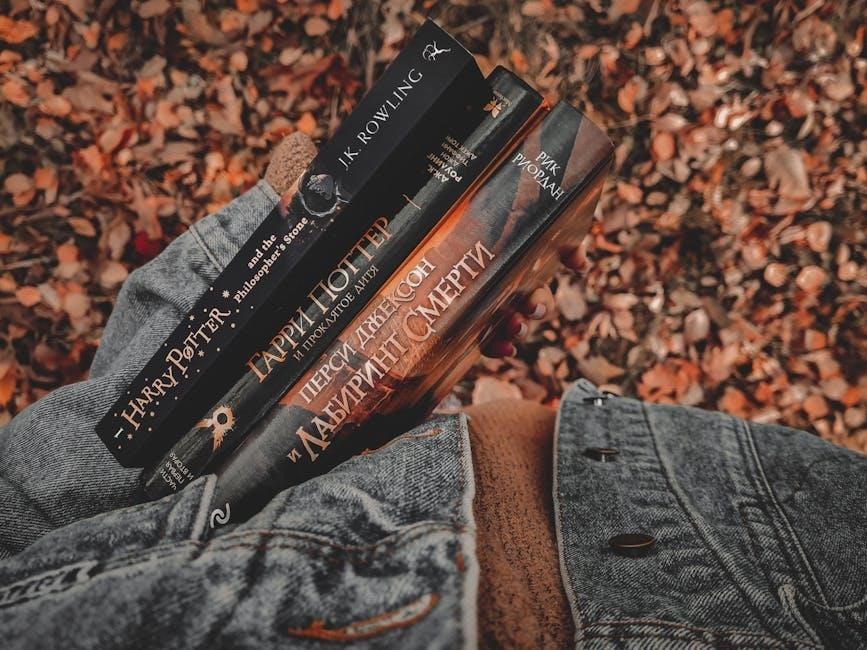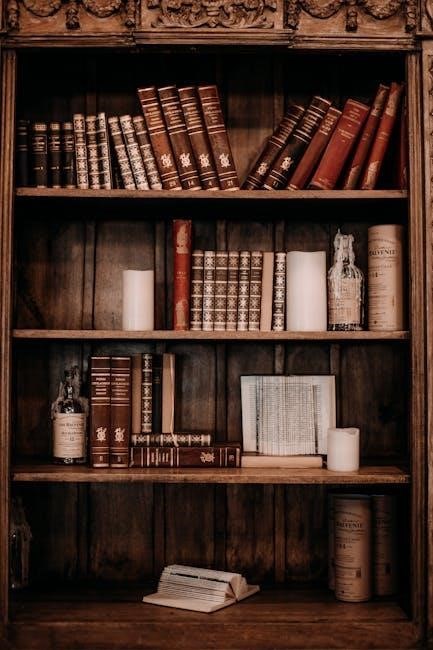Book 4 of Grandmaster of Demonic Cultivation continues Wei Wuxian’s haunting journey, delving into darker themes and intensifying conflicts. It explores moral ambiguity and the consequences of power, captivating fans worldwide with its intricate storytelling and emotional depth.
Overview of the Novel Series
The Grandmaster of Demonic Cultivation series, written by Mo Xiang Tong Xiu, is a captivating Chinese cultivation novel that delves into themes of power, morality, and redemption. Focused on the journey of Wei Wuxian, the story explores the complexities of demonic cultivation, blending elements of fantasy and historical fiction. The series has garnered significant popularity worldwide for its intricate plot and deep character development. Available in English, the novel continues to attract readers with its unique storytelling and cultural depth, making it a standout in its genre and fostering a dedicated global fan base.

Significance of Book 4 in the Series
Book 4 of Grandmaster of Demonic Cultivation holds immense significance as it deepens the exploration of Wei Wuxian’s journey and the moral dilemmas surrounding demonic cultivation. This installment escalates the conflict between cultivation sects and intensifies the stakes for the protagonist, offering a pivotal shift in the series. It introduces critical plot twists and character revelations, solidifying the novel’s reputation for emotional depth and complex storytelling. The book also expands on the lore of the cultivation world, providing readers with a richer understanding of the series’ themes and motivations. Its release has been highly anticipated, further cementing the novel’s global popularity and influence in the cultivation genre.
Author’s Background and Style
Mo Xiang Tong Xiu, the author of Grandmaster of Demonic Cultivation, is a renowned Chinese novelist known for her vivid storytelling and complex character development. Writing under this pen name, she blends genres like fantasy, romance, and mystery, captivating readers globally. Her unique style combines intricate world-building with deep emotional resonance, making her works highly immersive. The series, particularly Book 4, showcases her ability to explore moral ambiguity and the consequences of power. Mo Xiang Tong Xiu’s writing has significantly influenced the cultivation genre, earning her a dedicated fan base and inspiring adaptations into manhua and donghua. Her work continues to resonate for its thought-provoking themes and compelling narratives.

Plot Summary of Book 4
Book 4 delves into Wei Wuxian’s unresolved conflicts, unraveling ancient secrets and intensifying battles between cultivation and demonic forces. His pursuit of truth and power deepens the mystery.
Main Plot Points and Conflicts
In Book 4 of Grandmaster of Demonic Cultivation, Wei Wuxian’s relentless pursuit of truth intensifies as he uncovers hidden secrets about the cultivation world. The resurgence of the Stygian Tiger Seal poses a significant threat, forcing Wei Wuxian to confront formidable enemies and unexpected betrayals. Meanwhile, the mysterious Buried Heaven resurfaces, deepening the enigma surrounding Wei Wuxian’s past and his connection to the demonic path. The conflicts escalate as alliances are tested, and the line between friend and foe blurs. New challenges emerge, pushing Wei Wuxian to his limits, while the stakes grow higher for the entire cultivation world.
Development of Key Characters

In Book 4, Wei Wuxian’s character undergoes profound development as he grapples with the weight of his past and the burden of his demonic cultivation. His resolve is tested, revealing a deeper layer of resilience and determination. Meanwhile, Jiang Cheng’s struggles with his identity and loyalty come to a head, showcasing his internal conflict and growth. Lan Wangji’s unwavering support for Wei Wuxian highlights his steadfast devotion, while other characters like Nie Mingjue and Lan Xichen also experience significant emotional and moral challenges. The interactions and relationships between these characters evolve, adding depth to the story and their individual arcs.
Book 4 introduces compelling new antagonists and allies, expanding the story’s dynamics. A mysterious figure tied to the Hanguang Jun’s origins emerges, posing a formidable threat with unparalleled power and cryptic motives. Meanwhile, a new ally with ties to the Qinghe Nie clan joins Wei Wuxian, offering unexpected support and insights. These additions deepen the narrative, introducing fresh conflicts and alliances that challenge the protagonists. The antagonists’ complex backstories and the allies’ hidden agendas add layers of intrigue, while their interactions with established characters reveal new facets of loyalty, betrayal, and power struggles in the cultivation world.
Climactic Moments and Turning Points
Book 4 of Grandmaster of Demonic Cultivation is marked by intense climactic moments that redefine the story’s trajectory. A pivotal battle at the Burial Mound unleashes unprecedented chaos, with Wei Wuxian facing off against a powerful entity tied to his past. The truth about the Hanguang Jun’s origins is revealed, shocking both characters and readers. A betrayal by a trusted figure sends ripples through the plot, while the return of a long-lost ally shifts the balance of power. The convergence of multiple plot threads culminates in a heart-wrenching sacrifice, forever altering the fates of the protagonists. These moments leave readers on the edge of their seats, eager for resolution.

Character Analysis in Book 4
Book 4 delves deeply into the complexities of its characters, exploring their moral ambiguities and emotional depths. Wei Wuxian’s struggle with his demonic identity intensifies, while Jiang Cheng grapples with loyalty and vengeance. The dynamics between these characters are fraught with tension, revealing their vulnerabilities and strengths. Their interactions drive the narrative, creating a rich tapestry of relationships and conflicts that keep readers engaged.
Wei Wuxian’s Journey and Growth
Wei Wuxian’s journey in Book 4 is marked by profound internal conflict and transformation. His struggle with the demonic cultivation path deepens, as he grapples with the moral ambiguity of his powers. The weight of his past actions and the expectations of others force him to confront his identity and purpose. His relationship with Lan Wangji evolves, offering moments of emotional solace amidst chaos. Wei Wuxian’s growth is both painful and profound, as he learns to embrace his dual nature while striving to protect those he cares about. His development underscores themes of redemption and the blurred lines between good and evil.
Jiang Cheng’s Role and Struggles
Jiang Cheng’s role in Book 4 is defined by his ongoing internal turmoil and external conflicts. His complicated relationship with Wei Wuxian continues to shape his actions, as he struggles with guilt, loyalty, and identity. Jiang Cheng’s past mistakes haunt him, and his efforts to redeem himself are fraught with challenges. His interactions with other characters reveal deeper layers of his personality, showcasing both his resilience and vulnerability. Despite his flaws, Jiang Cheng remains a pivotal figure, embodying the struggle between duty and desire. His journey in Book 4 highlights his growth and the enduring impact of his choices on the story’s dynamics.
Other Key Characters and Their Development
In Book 4, other key characters play pivotal roles, each undergoing significant development. Nie Mingjue’s backstory and motivations are explored, revealing the depth of his loyalty and sacrifices. Lan Wangji’s calm demeanor contrasts with his growing inner turmoil, showcasing his unwavering dedication to Wei Wuxian. New characters introduced in this book add fresh dynamics, such as enigmatic figures whose true intentions blur the lines between friend and foe. These characters challenge the protagonists, forcing them to confront their beliefs and alliances. Their development enriches the narrative, highlighting themes of loyalty, sacrifice, and the complexity of human relationships in a world of cultivation and demons.

Themes and Symbolism in Book 4
Book 4 delves into themes of cultivation, identity, and power, exploring the moral ambiguities of demonic and righteous paths. Rich symbolism ties human nature to supernatural elements, enhancing depth.
Exploration of Cultivation and Demonic Paths
Book 4 of Grandmaster of Demonic Cultivation deeply explores the duality of cultivation and demonic paths, serving as metaphors for human nature’s struggle between light and darkness. The narrative delves into the moral ambiguities of these choices, questioning whether one path is inherently superior to the other. Through Wei Wuxian’s journey, the novel highlights the transformative power of embracing one’s true self, even if it means walking a controversial path. The author masterfully blends action with philosophical introspection, prompting readers to reflect on the consequences of ambition, identity, and the pursuit of power. This duality enriches the story’s emotional and thematic depth.
Morality, Redemption, and Consequences
Book 4 of Grandmaster of Demonic Cultivation intricately weaves themes of morality, redemption, and consequences, challenging readers to question the boundaries of right and wrong. Wei Wuxian’s actions in particular highlight the blurred lines between heroism and villainy, as his decisions, though well-intentioned, lead to far-reaching repercussions. The novel explores the idea that redemption is not a linear journey but a complex process shaped by regret, sacrifice, and the pursuit of balance. Characters grapple with the consequences of their past deeds, illustrating that growth often emerges from acknowledging and learning from mistakes. This thematic depth adds layers to the story, making it emotionally resonant and thought-provoking.
The narrative underscores the importance of accountability, showing how actions ripple through lives and worlds, ultimately shaping destinies.
Themes of Loyalty and Betrayal
Book 4 of Grandmaster of Demonic Cultivation delves deeply into themes of loyalty and betrayal, exploring how these forces shape relationships and destinies. Wei Wuxian’s unwavering loyalty to those he cares about is contrasted with the betrayals he endures, highlighting the fragility of trust. Jiang Cheng’s struggles with loyalty further complicate the narrative, as his actions often stem from a misguided sense of duty. The novel illustrates how betrayal, whether intentional or unintentional, can fracture bonds and alter the course of lives. These themes are central to the story’s emotional depth, underscoring the human capacity for both steadfast devotion and painful deceit.
The interplay between loyalty and betrayal drives the plot’s tension and character development, leaving a lasting impact on readers.

Cultural and Historical Context
Grandmaster of Demonic Cultivation draws heavily from Chinese cultural and historical influences, blending traditional cultivation practices with rich mythological elements. The story’s setting reflects ancient China’s spiritual and martial traditions, creating an immersive world that resonates deeply with fans of Chinese literature and history. These cultural roots enhance the narrative’s authenticity and appeal, making it a standout in the cultivation genre.
Chinese Cultivation Novels and Their Popularity

Chinese cultivation novels have gained immense popularity globally, particularly among fantasy and martial arts enthusiasts. These stories often blend spiritual growth, complex world-building, and moral dilemmas, resonating deeply with readers. The rise of web novels and translations has further boosted their reach, introducing Western audiences to this unique genre. Grandmaster of Demonic Cultivation stands out for its intricate plotting and emotional depth, attracting a dedicated fanbase. Its success reflects the broader appeal of Chinese cultivation fiction, which continues to inspire adaptations and foster vibrant fan communities worldwide.
Historical Influences on the Storyline
The narrative of Grandmaster of Demonic Cultivation draws heavily from China’s rich historical and cultural heritage. Themes of cultivation, sects, and spiritual arts are rooted in ancient Chinese martial arts novels and folklore. The story incorporates elements inspired by historical periods, such as the Ming and Qing dynasties, reflecting the societal hierarchies and clan systems of those eras. The novel also explores the tension between Confucian values and the pursuit of power, a dichotomy prevalent in Chinese history. These historical influences enrich the world-building, making the story relatable to readers familiar with Chinese culture while offering a fresh perspective to international audiences.
Cultural Significance of Demonic Cultivation
The concept of demonic cultivation in Grandmaster of Demonic Cultivation holds profound cultural significance, reflecting themes of resilience and moral ambiguity. It challenges traditional notions of good and evil, offering a nuanced exploration of power and redemption. The practice of demonic cultivation, often stigmatized, is portrayed as a complex path that demands sacrifice and strength. This duality resonates deeply with readers, as it mirrors real-world struggles between societal expectations and personal ambition. The novel’s portrayal of demonic cultivation has become a cultural phenomenon, sparking discussions about morality, identity, and the gray areas between light and darkness, making it a defining aspect of the series’ appeal.

Reception and Reviews of Book 4
Grandmaster of Demonic Cultivation Book 4 received widespread acclaim for its emotional depth, character development, and climactic plot twists. Fans praised its intricate storytelling and shocking revelations.
Fan Reactions and Community Discussions
Fans of Grandmaster of Demonic Cultivation Book 4 were electrified by its release, sparking intense discussions across online forums and social media. The emotional depth and shocking plot twists left readers captivated, with many expressing awe at the author’s ability to weave complex character arcs. Community debates focused on unresolved plotlines, theorizing about the fates of beloved characters and the true nature of the cultivation world. The introduction of new antagonists and allies also fueled speculation, as fans analyzed every detail for clues. The book’s moral ambiguity further divided opinions, with some praising its realistic portrayal of gray areas between good and evil, while others debated the consequences of the characters’ choices. Overall, Book 4 has solidified its place as a fan favorite, igniting passionate conversations that continue to grow.
Critical Reviews and Analysis
Critical reviews of Grandmaster of Demonic Cultivation Book 4 highlight its masterful storytelling and emotional depth. Critics praise the novel’s ability to balance intricate world-building with character-driven narratives, particularly the exploration of Wei Wuxian’s complexities. The moral ambiguity of cultivation and demonic paths has sparked analytical discussions, with reviewers noting the author’s bold approach to challenging traditional norms. While some critics mention pacing inconsistencies, the overall consensus applauds the book’s thematic richness and its ability to evoke profound emotional responses. The introduction of new layers in the storyline has solidified the series’ reputation as a landmark in Chinese cultivation novels, with Book 4 standing out for its intellectual and emotional resonance.
Comparisons with Previous Books in the Series
Book 4 of Grandmaster of Demonic Cultivation is often praised for its deeper exploration of character complexities and heightened emotional stakes compared to earlier installments. While the first three books laid the foundation for the world and relationships, Book 4 delves into darker themes and moral dilemmas, intensifying the narrative. Fans and critics note that the pacing in Book 4 feels more streamlined, with each chapter building upon the last, creating a sense of urgency. The character development, particularly of Wei Wuxian and Jiang Cheng, is more nuanced, offering a richer understanding of their motivations and struggles. This book is widely regarded as a turning point in the series, setting a new standard for storytelling and emotional depth.
Book 4 of Grandmaster of Demonic Cultivation masterfully concludes key arcs while setting the stage for future conflicts. Fans eagerly anticipate the resolution of unresolved plot threads and character destinies, ensuring the series’ enduring legacy.
Impact of Book 4 on the Overall Series
Book 4 of Grandmaster of Demonic Cultivation serves as a pivotal installment, reshaping the series’ trajectory. It deepens character arcs, particularly Wei Wuxian’s internal conflicts and growth, while introducing critical plot twists that alter the dynamics between major factions. The exploration of demonic cultivation’s moral ambiguities further enriches the narrative, challenging readers’ perceptions. The book’s climax leaves a lasting impact, setting the stage for future conflicts and unresolved tensions; Its influence is evident in how it elevates the stakes, solidifying the series’ reputation for intricate storytelling and emotional depth. This book is indispensable to understanding the series’ overarching themes and character journeys.

Anticipation for Future Installments
The release of Book 4 has sparked significant anticipation for future installments of Grandmaster of Demonic Cultivation. Fans eagerly await the resolution of unresolved conflicts and the continuation of character arcs, particularly for Wei Wuxian and other key figures. The introduction of new plot threads and antagonists has piqued curiosity about their development. The active fan community is abuzz with theories and speculation, further heightening excitement. Given the series’ reputation for intricate storytelling and emotional depth, readers are hopeful that future books will uphold this standard. The cultural impact and popularity of the series ensure that upcoming installments are highly awaited.
Legacy of “Grandmaster of Demonic Cultivation”
Grandmaster of Demonic Cultivation has left an indelible mark on the cultivation novel genre, praised for its compelling storytelling, complex characters, and emotional depth. Its unique blend of action, romance, and philosophical themes has captivated readers globally, setting a new standard for Chinese web novels. The series’ exploration of morality, power, and redemption resonates deeply, making it a cultural phenomenon. Its influence extends beyond literature, inspiring adaptations like manhua and drama series. Fans worldwide cherish its ability to evoke strong emotions and challenge societal norms. As a result, it remains a cornerstone of modern Chinese fantasy literature, continuing to inspire future writers and captivate audiences for years to come.
